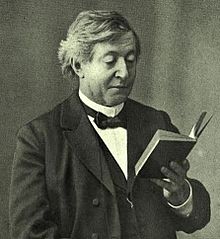Theodor Zahn

Theodor Zahn (Moers, 10 ottobre 1838 – Erlangen, 5 marzo 1933) è stato un teologo e biblista tedesco.
Carriera
[modifica | modifica wikitesto]Zahn nacque in Renania, Prussia (ora Germania). Dopo aver studiato a Basilea, Erlangen e a Berlino, diventò professore di teologia presso l'Università di Gottinga nel 1871. Occupò una cattedra simile a Kiel nel 1877, a Erlangen nel 1878, a Lipsia nel 1888 e nel 1892 tornò a Erlangen.[1] Fu nominato per il Premio Nobel per la Letteratura nel 1902, 1904 e 1908.[2] Teologicamente, Zahn si avvicina molto alla teologia del Nuovo Testamento.
Opere
[modifica | modifica wikitesto]- Marcellus of Ancyra (1867)
- Der Hirt des Hermas untersucht (1868)
- Ignatius von Antiochien (1873)
- Patrum Apostolicorum Opera (1875–78; 5 edizioni, 1905)
- The Acts of Saint John (1880)
- Forschungen zur Geschichte des neutestamentlichen Kanons und der altkirchlichen Litteratur (8 volumi, 1881–1908)
- Cyprian of Antioch and the German Story of Faust (1882)
- Geschichte des neutestamentlichen Kanons (2 volumi, 1889–92)
- Das apostolische Symbolum (1892; traduzione in inglese, The Apostles' Creed, 1899)
- The Gospel of Peter (1893)
- Einleitung in das neue Testament (2 volumi 1897–1900; 3ª edizione, 1906–07; traduzione in inglese, Introduction to the New Testament, 3 volumi, 1909)
- Brot und Salz aus Gottes Wort, 20 sermons, (1901; traduzione in inglese, Bread and Salt from the Word of God, 1905)
- Grundriss der Geschichte des neutestamentlichen Kanons (1901; seconda edizione, 1904)
- Das Evangelium des Lucas (1912)
Note
[modifica | modifica wikitesto]- ^ Andrew J. Bandstra, Zahn, Theodor, in Donald K. McKim (a cura di), Dictionary of Major Biblical Interpreters, 2nd, Downers Grove, Ill., IVP Academic, 2007, pp. 1072-1076, ISBN 978-0-8308-2927-9.
- ^ Nomination Database - Literature, su nobelprize.org. URL consultato il 29 aprile 2017.
Altri progetti
[modifica | modifica wikitesto] Wikimedia Commons contiene immagini o altri file su Theodor Zahn
Wikimedia Commons contiene immagini o altri file su Theodor Zahn
Collegamenti esterni
[modifica | modifica wikitesto]- Kommentar zum Neuen Testament Zahn's New Testament Commentary series in Dr. B. A. Zuiddam's Tasmanian study.
| Controllo di autorità | VIAF (EN) 22941633 · ISNI (EN) 0000 0001 0844 5045 · SBN TO0V180410 · BAV 495/89472 · LCCN (EN) n90618851 · GND (DE) 118991787 · BNF (FR) cb125179836 (data) · J9U (EN, HE) 987007279787705171 |
|---|